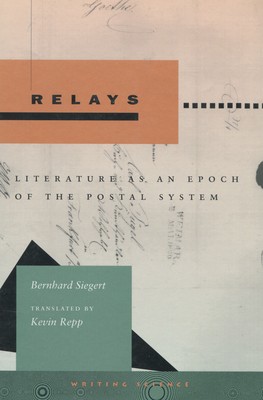
- We will send in 10–14 business days.
- Author: Bernhard Siegert
- Publisher: Stanford University Press
- ISBN-10: 0804732388
- ISBN-13: 9780804732383
- Format: 15.2 x 22.8 x 2 cm, softcover
- Language: English
- SAVE -10% with code: EXTRA
Reviews
Description
This book examines how one aspect of the social and technological situation of literature--namely, the postal system--determined how literature was produced and what was produced within literature. Language itself has the structure of a relay, where what is transmitted depends on a prior withholding. The social arrangements and technologies for achieving this transmission thus have had a particularly powerful impact on the imagination of literature as a medium.
The book has three parts. The first part reconstructs the postal conditions of classic and Romantic literature: the invention of postage in the seventeenth century, which transformed the postal system into a service meant to be used by the population (instead of by the prince alone); the sexualization of letter writing, which was introduced in the middle of the eighteenth century and changed the reading of a letter into an interpretation of intimate confessions of the soul; and Goethe's turning of this new ontology of the letter into a logistics of literature whereby literary authorship was constructed by means of postal logistics, with the precision of engineering.
The second part analyzes nineteenth-century postal innovations that facilitated communication through letters and examines how literary works were able to live off such communication. These innovations included the reform of the post office; the invention of the postage stamp; the Universal Postal Union, which subjected letter writing to an economy of materials and uniform standards; and the telegraph and the telephone, which surpassed literature in terms of speed, economy, and analog-signal processing.
In the third part, on the basis of a close reading of Franz Kafka's letters to his typist-fiancée, the author demonstrates how postal logistics of love and authorship have worked in the era of modern postal systems and technical media. Kafka's correspondence is deciphered as a "war of nerves" waged by means of all available techniques and conditions of transmission.
EXTRA 10 % discount with code: EXTRA
The promotion ends in 16d.20:46:59
The discount code is valid when purchasing from 10 €. Discounts do not stack.
- Author: Bernhard Siegert
- Publisher: Stanford University Press
- ISBN-10: 0804732388
- ISBN-13: 9780804732383
- Format: 15.2 x 22.8 x 2 cm, softcover
- Language: English English
This book examines how one aspect of the social and technological situation of literature--namely, the postal system--determined how literature was produced and what was produced within literature. Language itself has the structure of a relay, where what is transmitted depends on a prior withholding. The social arrangements and technologies for achieving this transmission thus have had a particularly powerful impact on the imagination of literature as a medium.
The book has three parts. The first part reconstructs the postal conditions of classic and Romantic literature: the invention of postage in the seventeenth century, which transformed the postal system into a service meant to be used by the population (instead of by the prince alone); the sexualization of letter writing, which was introduced in the middle of the eighteenth century and changed the reading of a letter into an interpretation of intimate confessions of the soul; and Goethe's turning of this new ontology of the letter into a logistics of literature whereby literary authorship was constructed by means of postal logistics, with the precision of engineering.
The second part analyzes nineteenth-century postal innovations that facilitated communication through letters and examines how literary works were able to live off such communication. These innovations included the reform of the post office; the invention of the postage stamp; the Universal Postal Union, which subjected letter writing to an economy of materials and uniform standards; and the telegraph and the telephone, which surpassed literature in terms of speed, economy, and analog-signal processing.
In the third part, on the basis of a close reading of Franz Kafka's letters to his typist-fiancée, the author demonstrates how postal logistics of love and authorship have worked in the era of modern postal systems and technical media. Kafka's correspondence is deciphered as a "war of nerves" waged by means of all available techniques and conditions of transmission.


Reviews